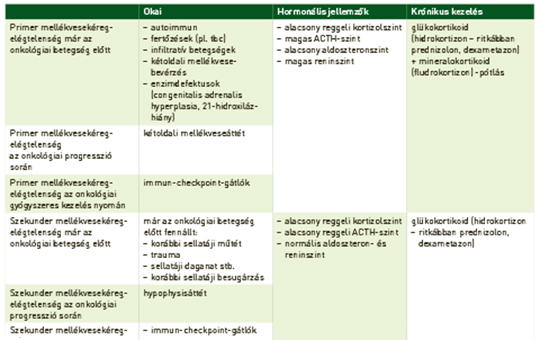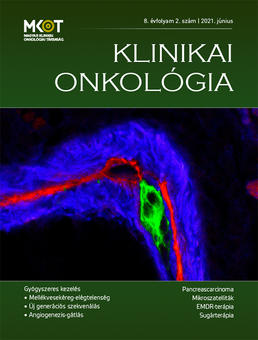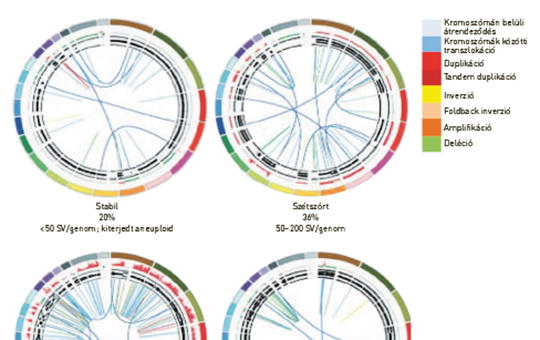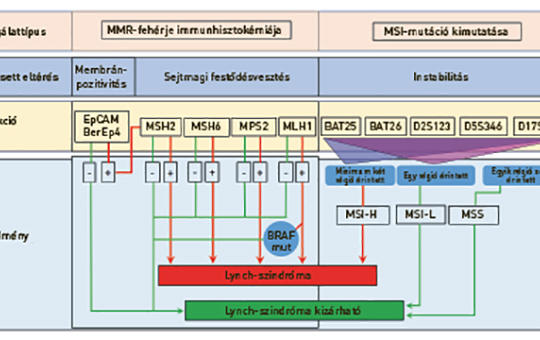The eLitMed.hu medical portal uses computer cookies for convenient operation. Detailed information can be found in the Cookie-policy.
Clinical Oncology - 2021;8(2)
Content
[Relevance of adrenal insufficiency in the management of oncological patients]
[Adrenal insufficiency has a complex relevance in oncology. On one hand, malignant tumors warranting treatment might develop in patients suffering from adrenal insufficiency, on the other hand, adrenal insufficiency might appear due to the progression of malignant tumor or to its therapy. During the progression of oncological disease, bilateral adrenal or very rarely pituitary metastases could result in adrenal insufficiency. Novel immune-checkpoint inhibitors, opioids and long-term glucocorticoid treatment can all lead to adrenal insufficiency. It is very important to recognize and to know the treatment of adrenal insufficiency, as failure of treating adrenal insufficiency might be related to severe, even fatal consequences. In this review, these clinically relevant fields are presented.]
[The role of next-generation sequencing in clinival oncology]
[Over the past decade next-generation sequencing has led to the in-depth understanding of the molecular background and driving mechanisms in most types of cancer. Parallel to the technological advances, novel targeted therapies have become available for oncology patients. As a result of this process, molecular diagnostics is now one of the main cornerstones of precision medicine with predictive biomarkers aiding patient care in oncology. In addition to standard monogenic testings, recently multigene testing methods based on next-generation sequencing came into view, supporting targeted therapeutic decisions and personalized medicine. In this review, we aim to depict the most important professional aspects related to the reasonable application of next-generation sequencing and the interpretation of its results.]
[Combining angiogenesis- and checkpoint-inhibitors to potentiate each other’s effects]
[Both, the inhibition of angiogenesis and the influence of immune-mediated processes play significantly growing role in non-surgical treatment of tumors. Neoangiogenesis of neoplasmas adversely affects the function of the immune system, so its inhibition enhances the action of T-lymphocytes and other factors that support their function, favorably affects the microenvironment of the tumor, while treatment with immune signaling sites helps to normalize the vascular system. Influencing those two targeting points together may have a beneficial effect. Authors present that the combined use of agents having those two targets in renal cell carcinoma, melanoma malignum, non-small cell lung cancer, colorectal cancer, hepatocellular and breast cancer noting that successful phase III studies have been performed predominantly in clear cell (or tumor that also contains a clear cell component) carcinomas. The authors emphasize that immunotherapy usually requires the detection of susceptibility-predicting parameters (corresponding PD-L1, MSI-H, dMMR, TMB-H) and that registered indications should be considered in addition to the therapeutic philosophy of tumor agnostic treatment.]
[Reshaping preoperative treatment of pancreatic cancer in the era of precision medicine]
[Summary – This review summarises the recent evidence on preoperative therapeutic strategies in pancreatic cancer and discusses the rationale for an imminent need for a personalised therapeutic approach in non-metastatic disease. The molecular diversity of pancreatic cancer and its influence on prognosis and treatment response, combined with the failure of ‘all-comer’ treatments to significantly impact on patient outcomes, requires a paradigm shift towards a genomic-driven approach. This is particularly important in the preoperative, potentially curable setting, where a personalised treatment allocation has the substantial potential to reduce pancreatic cancer mortality.]
[Microsatellites act as „seismographs” of the genome]
[Short non-protein-coding repetitive regions consisting of 1-6 bp sequences are called microsatellites. Failure in DNA polymerase activity during replication may lead to an increase or reduction in the number of these repeats. Generally, these microsatellite number variations are corrected via the DNA repair machinery; if not, the alterations are transmitted to the progeny, which is also indicated by the elevated mutation rate in the offspring. Microsatellite instability (MSI) can also cause reading-frame problems, and this can lead to elevated expression of foreign antigens in tumors, promising an enhanced efficacy of the anti-tumour immune response. Thus, MSI indicates not only genetic instability but also an increased efficacy of immune checkpoint inhibitors. Various tools such as PCR-based techniques or immunohistochemical methods have been developed to confirm MSI and to examine the functionality of the DNA repair mechanisms in these patients. Additionally, the recent technology also allows us to examine of microsatellites by using next-generation sequencing or artificial intelligence-based image analysis methods. In this review, we summarize recent methodologies and the clinical significance of MSI analysis. ]
[EMDR therapy in the treatment of oncology patients]
[The diagnosis and treatment of a life-threatening disease such as cancer involves exposure to psychological and physical stress and may constitute a traumatic experience for most people. Abnormal adaptation of neurobiological systems to the stress following experienced trauma, furthermore, individual factors such as previous traumas may also play a role in PTSD development. In the context of oncology, there is a specific need to develop better tools for psychological assessment, that address cancer-related stressors. It is hypothesized that eye movement desensitization and reprocessing (EMDR) therapy promotes the elicitation of the innate self-healing capacity, the natural healing process of the immune system and adaptive information reprocessing. The EMDR therapeutic intervention with oncological patients aims to repair the psychic balance, empower resilience factors and to allow the processing of traumatic disease-related experiences.]
[Radiotherapy induced secondary malignancies]
[Radiation therapy is an integral part of oncology treatments, and almost half of the patients receive radiation as a curative or palliative treatment. Thanks to modern oncology strategies survival period is getting longer, how-ever, approx. one-fifth of patients also experiences the development of second tumor. According to recent studies, oncological treatment itself may be associated with the development of a secondary tumor. It is estimated that 5-8% of such cases may be due to radiotherapy. It is a major challenge to understand the effects of radiotherapy on accidentally surviving tumor cells, healthy tissues surrounding the tumor, low-dose areas, and non-irradiated tissues, where abscopic effects may occur and may be collectively responsible for the so-called radio carcinogenesis. Recently, a number of studies address the tumor-inducing effects of radiation therapy. This review is intended to summarize our knowledge of the subject in terms of pathogenesis, radiogenomics, and radiophysical and radiobiological aspects, as well as prevention and screening options. Radiation therapy represents a double-edged sword: on the one hand it can be effectively used in the curative treatment of cancer, on the other hand, however, it can potentially induce a secondary tumor that occurs years later. Based on the above considerations only maximally optimized and personalized radiation therapy can be justified in the future. ]
1.
Clinical Neuroscience
[Headache registry in Szeged: Experiences regarding to migraine patients]2.
Clinical Neuroscience
[The new target population of stroke awareness campaign: Kindergarten students ]3.
Clinical Neuroscience
Is there any difference in mortality rates of atrial fibrillation detected before or after ischemic stroke?4.
Clinical Neuroscience
Factors influencing the level of stigma in Parkinson’s disease in western Turkey5.
Clinical Neuroscience
[The effects of demographic and clinical factors on the severity of poststroke aphasia]1.
2.
Clinical Oncology
[Pancreatic cancer: ESMO Clinical Practice Guideline for diagnosis, treatment and follow-up]3.
Clinical Oncology
[Pharmacovigilance landscape – Lessons from the past and opportunities for future]4.
5.







